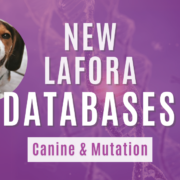Empowering Lafora Disease Research: Launch of Patient Mutation and Canine Databases
Hear from Emilie Heller about the launch of two databases she worked on:
“Hi everyone! My name is Emilie and I’ve just wrapped up my time at Chelsea’s Hope as the Research Network Development Intern. I’m excited to share about the launch of two Lafora databases.
Patient Mutation Database
Our new Patient Mutation Database is a comprehensive list of all the reported and published mutations leading to Lafora disease. Firstly, this database will assist with identifying disease-causing mutations. Furthermore, the database will improve our ability to predict mild versus classical disease progression to better treat Lafora patients. The mutation database will be freely available to anyone who registers for access. Researchers and clinicians are also invited to report novel mutations to help us develop a more accurate picture of disease-causing mutations in Lafora disease.
Launch of Canine Registry and Database
During my time interning at Chelsea’s Hope, I also compiled a central database with comprehensive data on affected canines. Numerous canine breeds are susceptible to Lafora disease, a rare and fatal progressive epilepsy causing neurodegeneration. By focusing on canine research on Lafora disease, scientists aim to unravel crucial insights into this complex disorder.
Formed by compiling many studies among leading research institutions, the initiative establishes a dedicated database and registry exclusively focused on collecting canine data related to Lafora disease. This database will serve as a repository for invaluable information, encompassing genetic data, phenotypic profiles, and treatment regimens for affected dogs.
Our organization will maintain and regularly update this database of mutations associated with Lafora disease in canines and their associated phenotypes. By cataloging genetic variations observed in affected canines, researchers will be able to identify patterns and correlations that could shed light on the underlying mechanisms of the disease. This comprehensive canine database is poised to facilitate targeted investigations into the genetic basis of Lafora disease, both paving the way towards finding a cure for our canine friends, and accelerating treatment for human patients with Lafora.”
Researchers and veterinarians can request access to the database. Dog owners can add their affected dog to the Lafora Canine Registry.
Disclaimer: Emilie’s post was edited for clarity.
Find the webpages and forms for accessing the databases on the Chelsea’s Hope website. The organization looks forward to empowering Lafora disease research and fostering collaboration. Finally, please email katherine@chelseashope.org with any questions.

